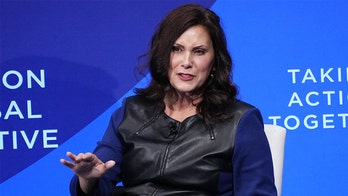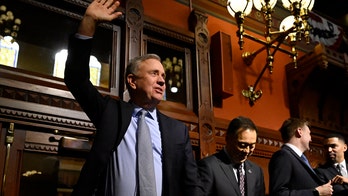Much attention has been given to President Obama's persistent use of "I" when giving speeches to sell his administration's agenda. Is he taking responsibility -- or, as his critics say, is he still in campaign mode? FoxNews.com is tracking the president's speeches all this month and will report back after each to see whether The "I's" Have It.
Today's Speech: Opening remarks before town hall-style meeting at the University of Tampa in Tampa, Fla.
Subject: Jobs, the economy and health care reform
Speech Length: 3,399 words
Number of "I" References: 96
The following is a transcript of Obama's remarks:
Thank you, everybody. Hello, Tampa! (Applause.) Thank you so much. Thank you, everybody. It's great to see you. All right, everybody just make yourselves comfortable. We're going to be here for a little bit. (Applause.) Thank you. Thank you.
We've got -- we've got some special guests that I want to make sure we acknowledge. Florida CFO Alex Sink is in the house. (Applause.) Representative Kathy Castor, your representative. (Applause.) Representative Alan Grayson. (Applause.) Representative Kendrick Meek. (Applause.) Representative Debbie Wasserman-Schultz. (Applause.) Your own mayor, Pam Iorio. (Applause.) The mayor of Orlando, Buddy Dyer. (Applause.) The president of University of Tampa, Ronald Vaughn. (Applause.)
And two very special -- two very special guests, Brian C. Smithey and Roger J. Picard. I want you guys to know who these folks are. They are members of the FEMA Florida Task Force Team 2 Canine Search Specialists. They went down to Haiti and worked 26-hour-long shifts, staying with victims until they were rescued. The Florida Task Force Team saved seven lives. Brian worked at a school where his dog, Powder, found a young adult female buried in the rubble three to four days. So these are the kinds of heroes that make America proud, and I want everybody to give them a big round of applause. Stand up. Stand up. (Applause.) Thank you.
And I haven't spotted him in the crowd yet, but I've got to do this -- even though I know you all are upset that he took all that success to the Colts -- (applause) -- he made his name here in Tampa. (Applause.) And he's not just a great coach, but he's just a model individual and leader, we're very proud to have him in the house, Coach Tony Dungy. (Applause.)
Any of you want some analysis about the upcoming Super Bowl, Coach is free to give -- no, I'm just -- it's good to see you, Coach.
All right. Now, first of all let me say it's good to be back in the Sunshine State. (Applause.) It is especially good to be back in January. (Laughter.) And it's always nice to get out of Washington -- it is -- and spend a little time with the people who sent me to Washington. (Applause.)
Now, last night I spoke with you about where we've been over the past year and where I believe we need to go. And I said what all of you know from your own lives: These are difficult times; these are challenging times for our country.
In the last two years, we've gone through the deepest recession since the Great Depression. Think about that. A big chunk of the people here -- certainly the younger people here -- have never even seen a recession; they don't even -- it doesn't register on their minds. This is by far the toughest thing that the country has gone through economically since the 1930s.
And Tampa, like so many communities across our country, has felt the lash of shuttered businesses and lost jobs and home foreclosures and vanished or dwindling savings. And this storm came at the end of what some call a lost decade -- because what happened between 2000 and now, it was a decade in which paychecks shrank and jobs barely grew, and the costs of everything from health care to college education went up. Irresponsibility from Wall Street to Washington left good, responsible Americans who did everything right still struggling in ways they never imagined.
Joe and I took office in the middle of this raging storm. We ran for office, the highest office, because we had been hearing stories like this day in, day out, for years, even before the financial crisis hit. So we're not going to rest until we rebuild an economy in which hard work and responsibility are rewarded, and businesses are hiring again, and wages are growing again, and the middle class can get its legs underneath it again. (Applause.) We will not rest until we build an economy that's ready for America's future.
Now, to do that, the first thing we had to do was break the back of this recession. And that required some tough, in some cases unpopular but unnecessary -- all which were necessary steps. I mean -- I mentioned this last night -- none of us wanted to have to stabilize the banking sector, particularly since they helped create this mess. (Applause.) But, as I explained last night, if we hadn't, the financial system literally could have melted down and that would have taken our entire economy and millions more families and businesses with it.
But because of the steps we've taken, now the markets have stabilized. The economy is growing again. (Applause.) The worst of the storm has passed. But I think all of you understand the devastation remains. One in 10 Americans still can't find work. That's why creating jobs has to be our number one priority in 2010. (Applause.)
The true engines of job creation here in America are America's businesses. And there are several steps we can take to help them expand and hire new workers. Last night I proposed taking $30 billion of the money that went to Wall Street banks but have now been repaid and use it to help community banks give small businesses the credit they need to stay afloat. (Applause.) That will help. I also proposed a new tax credit for more than 1 million small businesses that hire new workers or raise wages. And while we're at it, I believe that we should eliminate all capital gains taxes on small business investment, and provide a tax incentive for all businesses to invest in new plants and equipment. (Applause.)
As Joe mentioned, we're going to put more Americans to work rebuilding our infrastructure, and building our infrastructure of the future. I mean, it's important to repave our roads; it's important to repair our bridges so that they're safe. But we want to start looking deep into the 21st century -- (applause) -- and we want to say to ourselves, there is no reason why other countries can build high-speed rail lines and we can't. (Applause.) And that's what's about to happen right here in Tampa -- we are going to start building a new high-speed rail line -- (applause) -- right here in Tampa, building for the future, putting people to work. (Applause.)
I'm excited. I'm going to come back down here and ride it. (Laughter and applause.) Joe and I -- you all have a date. When that thing is all set up, we'll come down here and check it out. (Laughter.)
And by the way, this high-speed rail line is being funded by the Recovery Act. (Applause.) And one other thing we can start doing for jobs here in America that I mentioned last night -- I talked about this all through the campaign. We put this proposal in our budget, we keep on getting resistance, but we are going to keep on pushing to end tax breaks for companies that ship our jobs overseas and give those tax breaks to companies that create jobs right here in the United States of America. (Applause.) It's the right thing to do. It's the right thing to do. It's the right thing to do. (Applause.)
Now, I have to say this: The steps that I just mentioned will help accelerate job growth in an economy that is already beginning to grow, but the steps we take alone won't make up for the 7 million jobs we lost over the last two years. I mean, keep in mind, when we were sworn into office, that December we had lost 650,000 jobs. January, as we were being sworn in, we lost 700,000 jobs; February, 650,000 jobs. So before we could even put in place the Recovery Act, you had already seen millions of jobs lost. That's a deep hole that we're going to have to fill. And the only way to do that is to lay a new foundation for long-term economic growth and finally address the struggles that middle-class families have been grappling with for years.
Now, Florida, that's why Joe and I asked for the chance to serve as your President and Vice President. (Applause.) Look, we didn't seek this office to push our problems off or take the easy road through the next election. We ran to solve problems -- problems that had been nagging at America for decades. We want to solve them for the next generation. We ran to get the tough stuff done. (Applause.) So as I mentioned last night, I make no apology for trying to fix stuff that's hard, because -- (applause) -- I'll be honest with you -- I'll be honest with you, Joe and I are both pretty smart politicians, we've been at this a while. (Laughter.) The easiest way to keep your poll numbers high is to say nothing and to do nothing that offends anybody. (Applause.) That's true. No, no, no, you just wave, smile and -- (laughter.) That's how you do it.
The minute you actually start doing something, somebody is going to disagree with you. (Applause.) But that's what I promised. Some of you remember the campaign. I said I wasn't just going to tell you what you want to hear, I was going to tell you what you need to hear. (Applause.) So none of this is new. There's nothing that we have talked about since we entered the White House that we didn't talk about during the campaign. And so long as we have the privilege of serving you, we will not stop fighting for your future, no matter how many lumps we've got to take to get it done. (Applause.)
I do also have to just mention -- I'm going to mention -- you know I love you in the media, but I will mention this little aspect of our media. Our friends with the pads and the pencils -- last week I went to Ohio and I started saying what I'm saying now, which is, I'm going to fight for your future. And they got all worked up. They got worked up last week. They said, is he trying to change his message; is he trying to get more populist; is this a strategy that he's pursuing to boost this, that and the other; is this something new?
I just had to do a little rewind here of how we ran our grassroots campaign -- (applause) -- because I've got some news. I've got some news of my own here. I've been fighting for working folks my entire adult life. (Applause.) That's why I entered public service -- to fight for folks in Chicago. That's why I ran for the state Senate. That's why I ran for the U.S. Senate. That's why I ran for President -- to fight for people here in Tampa, and people here in Florida, and to fight for people all across the United States of America. (Applause.)
I seem to remember coming to Tampa two weeks before the election -- (applause) -- and you know what I said? This is a quote, people can check -- I'm sure it was reported in the newspapers. I said, "Change never comes without a fight." (Applause.) That was true then. It's true now. Change never comes without a fight, Florida. So I won't stop fighting; I know you won't, either.
We're not going to stop fighting to give our kids a world-class education, to make college more affordable, to make sure that by 2020 we have the highest rate of college attendance of any country in the world. (Applause.) So we proposed that graduates should only pay 10 percent of their income to pay back their student loans. (Applause.) Students like that. (Applause.) And what I've said is we'll forgive student loan debt after 20 years -- but after 10 if you choose a career in public service. Because if you decide you want to be a teacher -- (applause) -- if you decide you want to be a cop, if you're not making huge amounts of money we don't want to discourage you from that because of the cost of college. And by the way, I've been there and Michelle has been there -- it took us 10 full years to pay off Michelle's student loans, 15 to pay mine off. (Laughter.) So I've been there. And our belief, and I think your belief, is in the United States of America nobody should go broke because they chose to go to college. We want everybody to go to college, and we don't want them going broke doing it. (Applause.)
We won't stop fighting to spark innovation and ignite a clean energy economy where America's workers are building solar panels and wind towers and cutting-edge batteries for automobiles -- because the nation that leads the clean energy revolution will be the nation that leads the global economy. (Applause.) And, as I said last night, other countries aren't waiting. They want those jobs. China wants those jobs. Germany wants those jobs. They are going after them hard, making the investments required.
We're not going to stop fighting to give every American a fair shake. The first bill I signed into law was making sure that there was equal pay for equal work for women -- the Lilly Ledbetter Act -- (applause) -- because I think you should be paid the same for doing the same work. That's just fair. (Applause.) And by the way, men, you should have been standing up clapping for that because -- (laughter) -- because most families today are depending on two paychecks, not one, to get by. (Applause.)
We're not going to stop fighting to protect the American consumer. That's why I signed a Credit Card Bill of Rights into law to protect you from surprise charges and retroactive rate hikes and other unfair rules. That's why I'm fighting for a tough consumer financial protection agency to protect you against things like hidden fees that can make an ATM withdrawal cost 30 bucks. (Applause.)
I just want to be clear here, for the benefit of my friends in the back. (Laughter.) We need a strong financial sector. Without it, businesses can't get capital to grow and create jobs. Families can't finance a home loan or education. So we want a healthy financial sector. And there are folks all across the country working in banks who are doing great service to their community. But we also need some rules of the road for Wall Street, so that reckless decisions made by a few don't take our economy over the side. (Applause.) That's common sense. There's nothing radical about that. In fact, the banks should want it because it would create greater stability in the system.
And, yes, we will not stop fighting for a health care system that works for the American people, not just for the insurance industry. (Applause.) We won't stop. We want a system where you can't be denied care if you have a preexisting condition. (Applause.) You can't get thrown off your insurance right at the time when you get seriously ill. We want a system where small businesses can get insurance at a price they can afford. (Applause.)
Nobody pays more than small businesses and individuals who are self-employed in the insurance market, because they've got no leverage. We want to change that by allowing them to be able to set up a pool. We want to make sure that people who don't have coverage can find an affordable choice in a competitive marketplace. (Applause.) We want a system in which seniors don't have these huge gaps in their Medicare prescription drug coverage -- (applause) -- and where Medicare itself is on a sounder financial footing. Those are the things that we're fighting for.
And I'm not going to stop on that, because it's the right thing to do, and by the way, if you are serious about reducing our deficit and debt you cannot accomplish it without reforming our health care system, because that's what's gobbling up more federal dollars than anything else. (Applause.) I don't understand folks who say they don't want to see government spending out of control, and then are fighting reforms that the Congressional Budget Office says would cut a trillion dollars off our deficit over the next two decades. (Applause.) Those aren't my numbers.
Now, we're never going to stop fighting to cut waste and abuse in Washington. We do have to rein in deficits that have been accumulating for too long. Families across the country are tightening their belts and making tough decisions. It's time for the federal government to do the same. And that's why I proposed specific steps last night to bring the deficit down. And I'm grateful that the Senate just passed, as we were flying down here to Florida, a rule called pay-as-you-go, or PAYGO, that was a big reason we had record surpluses in the 1990s instead of the record deficits that were handed to me when I ran -- walked into office.
Look, it's a very simply concept, this PAYGO. It basically just says you got to pay as you go. (Laughter.) It's sort of how you live. At least after you cut up those credit cards. (Laughter.) Basically, you want to start a new program? Start a new program. But you've got to end an old one that pays for it. If you want to cut taxes, great, cut taxes. But you've got to figure out how to fill the revenue that results when you lose that tax revenue. So the idea is just honest accounting. That's what's needed.
Let me say one more word about health care. I just got to -- I'm gnawing on this bone a little bit. (Laughter.) I know that the longer the process worked through on a complicated issue like this, the uglier it looked. You know, there's -- and it doesn't help when you've got the insurance industry spending several hundred million dollars advertising against it, but -- but after a while, people didn't know what to think. And you started asking yourselves, what's in it for me?
And as I said last night, I take my share of the blame for not explaining our approach more clearly. But this problem is not going to go away. The tough stories I read in letters at night, they're not stopping. I'm not going to walk away from these efforts. And I won't walk away from you. (Applause.) And I don't think Congress should walk away, either. We are going to keep working to get this done. And I hope we can get some Republicans to join Democrats in understanding the urgency of the problem. (Applause.)
On every one of these issues my door remains open to good ideas from both parties. I want the Republicans off the sidelines. I want them working with us to solve problems facing working families -- not to score points. I want a partnership. What we can't do, though -- here's what I'm not open to. I don't want gridlock on issue after issue after issue when there's so many urgent problems to solve. (Applause.) And I don't want an attitude, "If Obama loses, then we win." I mean, that can't be a platform. (Applause.) Even if you disagree with me on some specific issues, all of us should be rooting for each other. (Applause.) All of us should be working for America moving forward and solving problems.
So that, you know, "you lose, I win" mentality, that mindset may be good for short-term politics, but it's not a mindset that's equal to these times. (Applause.) It's not worthy of you. What you deserve is for all of us, Democrats and Republicans, to work through our differences, overcome our politics, do what is hard, do what is necessary to advance the American Dream and keep it alive for our time and for all time. (Applause.)
We have come through a tough year, and a tough decade. But a new year is here and a new decade is stretching before us. Opportunities are there for the taking: every business owner working on the innovation of tomorrow; every student reaching for a better future; every ready -- everyone ready to roll up their sleeves and play their part in rebuilding America.
Yes, we can. (Applause.) We don't back down. We don't quit. We are Americans. And today, here with all of you, I have never been more hopeful about our future than I am right now. I am confident that we can make this happen and move this country forward.
Thank you very much, Tampa. I love you guys. Thank you. Thank you. Thank you. (Applause.)




